International Security and Defense
What is the most important global challenge for your country to address?
Before the pandemic, Germans viewed climate change as the top global challenge. For French and Americans terrorism/extremism was first and climate change second. Now all respondents see health crises as the most important global challenge to address.
The prioritization of global challenges has changed in all three countries between January and May. The global impact of the pandemic seems to have pushed other global challenges to the background, although in Germany climate change is still considered a current and important global issue.
In January, Germans had the clearest top priority, with a third of respondents placing climate change first, followed by migration at 20%. Terrorism and extremism—top priority for the French and Americans (25-26%)—ranked a distant fourth in Germany (12%). Germans who indicated a party affiliation tended to follow party lines, with 64% of Green voters placing climate change on top of the list, while half of AfD voters believed migration to be the biggest challenge (50%). Respondents were more conflicted in France and the United States where a nearly equal amount ranked either terrorism or climate change first (26% for terrorism and extremism in both countries and 24% of Americans and 22% of French prioritized climate change).
What do you think is currently the most important global challenge for your country to address?
(Responses "none of the above" and "Relations with another country" are not included.)
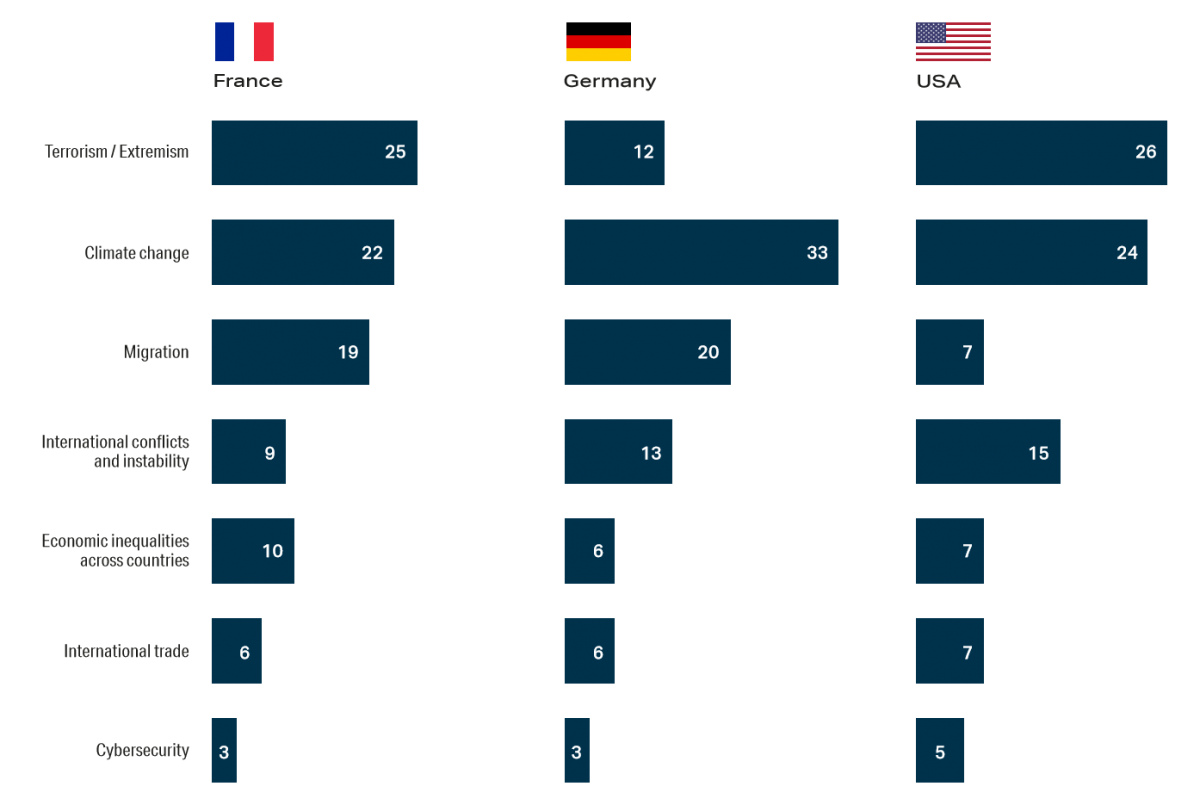
BEFORE COVID-19
Sample: France 1004; Germany 1001; USA 1001. Expressed in % rounded up to the next unit for decimals .5 and higher.
In the second round of the survey, there is a shared consensus in Germany, France, and the United States that health crises are now the most important global challenge they face. This is especially true in France and the United States, where health crises top the rankings by a significant margin. Climate change comes second in all three countries, but now only 12% of French and American respondents rank it most important, a drop of 10+ points. In the midst of the coronavirus pandemic, 24% of Germans still believe that climate change is the biggest international issue. Only 10% of Americans and 11% of French currently believe that terrorism/extremism is the most important global challenge facing their country.
The results of this question indicate that events have been experienced differently in each society. Although both France and Germany have been affected by terrorism in recent years, the impact on national debate has clearly been very different, as illustrated by the 14-point difference between the two countries regarding terrorism and extremism observed in January. Similarly, though all three countries were in some form of coronavirus lockdown when surveyed in May, the pandemic had shifted priorities in Germany much less dramatically than in France and the United States.
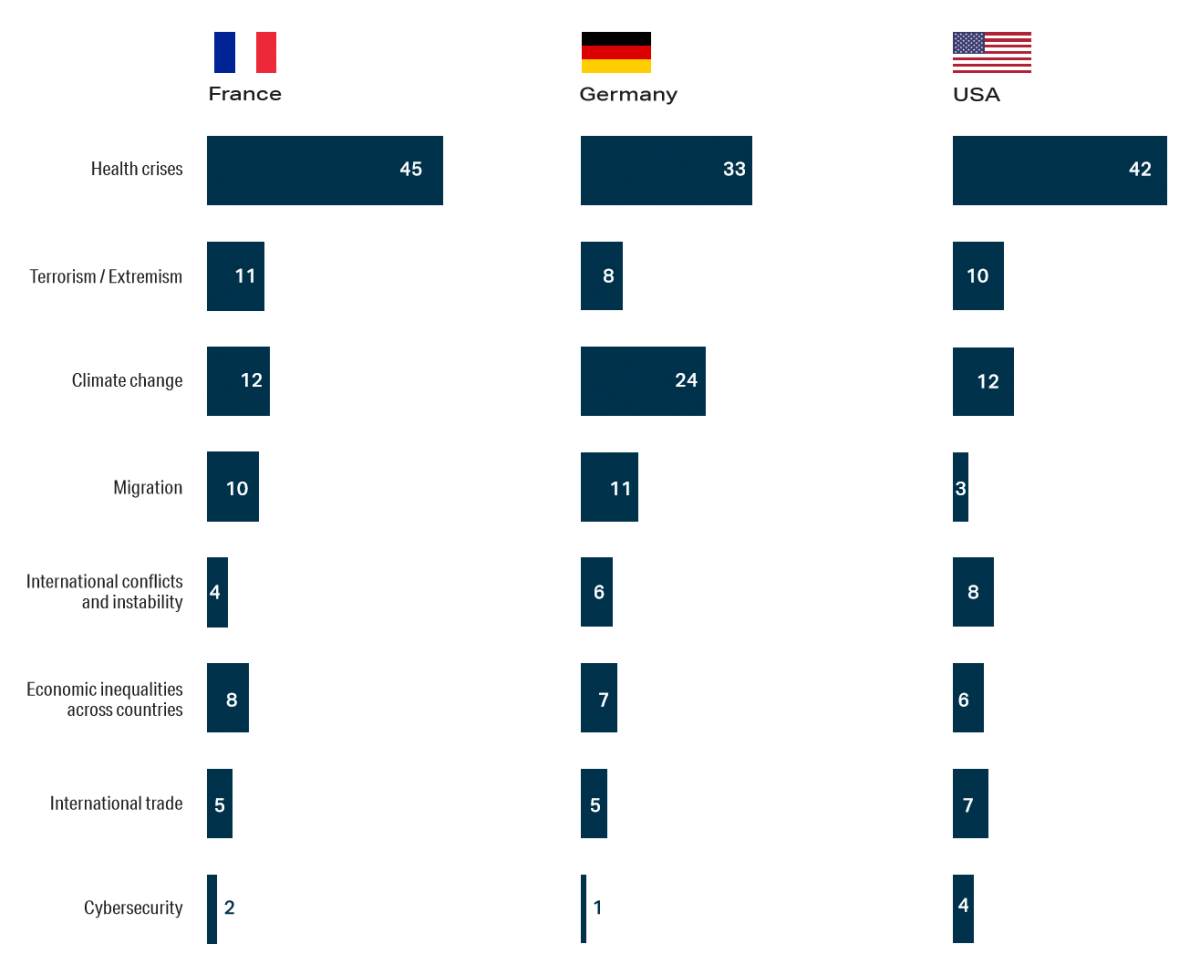
AFTER COVID-19
Sample: France 1000; Germany 1001; USA 1000. Expressed in % rounded up to the next unit for decimals .5 and higher.
How important is NATO in the security of your country?
More than two-thirds of Germans and Americans believe NATO plays an important role in the security of their country, while in France only half think it is important, and a quarter say NATO is unimportant for their security.
Despite President Trump’s vocal criticism of the transatlantic alliance, 70% of American respondents consider NATO important for their security, including 43% who see it as “very important.” Interestingly, this support is reflected rather evenly on both sides of the aisle: 72% of Republicans and 79% of Democrats think the transatlantic alliance is important for U.S. security. American respondents were least likely to consider NATO unimportant in ensuring their security (10%).
Nearly three quarters of Germans (74%) say that the alliance plays an important role in their country’s security, with a third believing it to be “very important” (34%). There are some variations along party and age lines: 85% of Greens see NATO as important compared to 61% of AfD respondents, and while 78% of Germans ages 45-54 think NATO is important, this falls to 69% among younger Germans (ages 18-24).
In France only a narrow majority of 53% of respondents consider the Alliance important for the security of their country, and only 16% see it as “very important." This is half as many as in Germany or the United States. Skepticism is spread almost equally across the French political spectrum: 29% of left-leaning French respondents, 27% of En Marche supporters, 27% of respondents from center-right parties, and 28% of National Rally respondents think NATO is not important for their security.
Interestingly, almost a quarter of French (22%) do not have an opinion about or do not know what NATO is (vs. 11% of Germans), The number of American respondents who also do not know what NATO is only a bit lower than in France (19%), despite it being a relatively high-profile topic for the Trump administration.
In your opinion, what is the importance of NATO’s (the North Atlantic Treaty Organization’s) role in the security of your country?
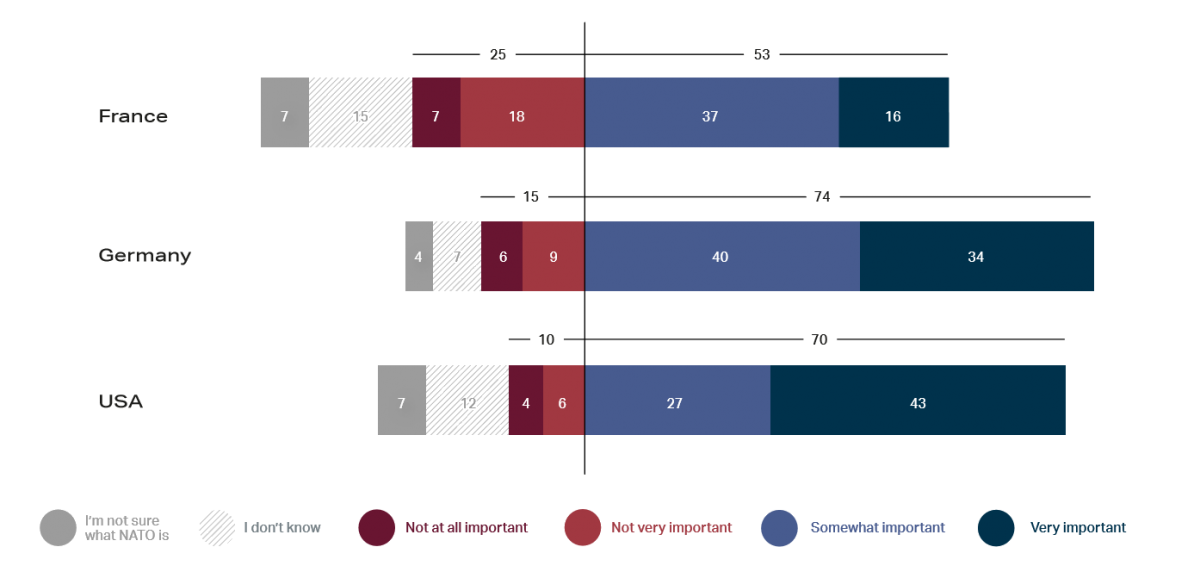
Sample: France 1004; Germany 1001; USA 1001. Expressed in % rounded up to the next unit for decimals .5 and higher.
How involved should the United States be in the defense and security of Europe?
A strong majority of Americans and Germans believe the United States should share responsibility for the security and defense of Europe, while the French are more skeptical and divided on the issue.
Overall support for U.S. involvement in European security and defense is the highest in the United States itself. Nearly two-thirds of Americans (65%) are in favor of U.S. involvement in European security and defense. That number is highest among older and well-educated Americans (74% of older respondent (55+) and 72% of highly educated respondents). Similar to the question of NATO's importance, this seems to be a rare issue of close partisan agreement: 72% of Democrats and 71% of Republicans believe the U.S. should be involved in European security.
In Germany, a strong majority favor U.S. involvement (59%), with variation along party lines. An overwhelming majority of voters affiliated with the center-right parties are in favor of U.S. involvement (Liberals (FDP) at 78% and the CDU/CSU at 73%). A smaller, but still clear majority of voters from the center-left parties also support a U.S. role in Europe (Greens 60%, Social Democrats 59%). Respondents from the Left Party (Die Linke) are divided, with 42% in favor and 44% against U.S. involvement. The far-right AfD is not as opposed to U.S. involvement as one might suspect, with 57% indicating support for a U.S. role.
The French are more skeptical toward U.S. involvement in the security and defense of Europe. While a plurality of 45% expressed support for U.S. involvement in the defense and security of Europe, almost as many (41%) think the U.S. should not play a role, in contrast to only 29% of Germans and 21% of Americans against involvement. Similarly, only 11% of French believe the U.S. should be greatly involved—a 14-point difference from responses in Germany (25%).
The contrast between French and German responses is consistent with France’s historical ambivalence toward U.S. involvement in European security and the longstanding idea that Europeans should increase their independence. At the same time, the high levels of support for a U.S. role in European security among Americans suggest that some long-lasting values are resistant to political shifts, indicating a robustness—still—in transatlantic cooperation on security and defense.
How much do you think the United States should be involved in the defense and security of Europe?
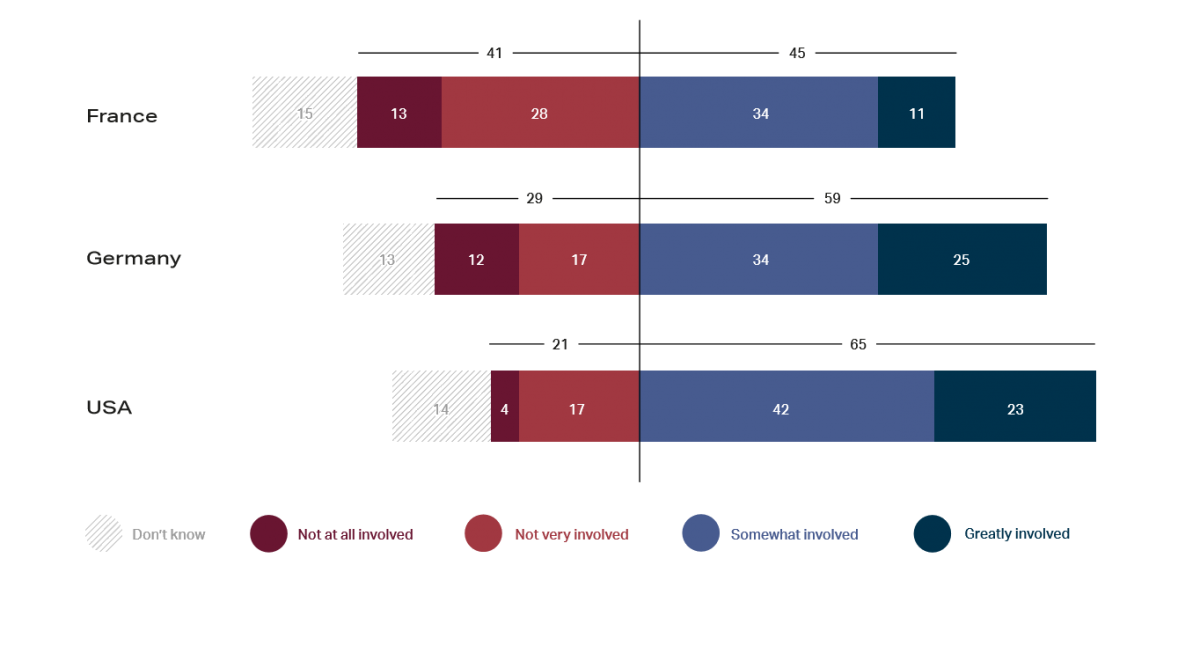
Sample: France 1004; Germany 1001; USA 1001. Expressed in % rounded up to the next unit for decimals .5 and higher.
Do you think that your government should change how much it spends on defense?
Support for increasing defense spending is inversely correlated with current spending, with support for a spending hike highest in Germany. Americans are evenly split on whether to increase or decrease budgets.
Germans have been facing pressure to increase defense spending in recent years from both France and the United States, and in 2019 Berlin made new commitments to meet their NATO treaty obligations on spending. The debate may have had an effect because Germans are the most in favor of increasing military expenditures: with a plurality of 35% wanting to either increase (25%) or heavily increase (10%) defense spending (while 30% want to maintain current levels). In France and the United States a plurality in both favor maintaining current levels.
In all three countries, the responses follow expected partisan lines. In the United States, Republicans want to spend more on defense (35% favor an increase, 15% favor a decrease), while Democrats want to spend less (37% decrease, 19% increase). It is a similar picture in France and Germany, with right-wing parties tending to favor an increase in spending while left-wing parties support a decrease. In Germany the most hawkish are CDU/ CSU (44% increase, 16% decrease), AfD (48% increase, 22% decrease), and FDP (51% increase, 21% decrease). Germany's left-wing Die Linke adherents are strongly against an increase in defense spending (44% against, 16% for higher spending). French right-wing voters are likewise in favor of higher spending on defense, though slightly less than their German counterparts: 42% support an increase and 16% favor a decrease. French leftwing voters prefer to maintain current defense spending levels (45%).
Interestingly, on a number of questions, including this one, respondents with no party affiliation tend not to have an opinion. Thirty-four percent of independent American voters do not know whether the United States should increase, decrease, or maintain its defense spending; in France and Germany 25% of the non-affiliated also had no opinion on military spending.
Do you think your country's government should change how much it spends on defense? My government should…
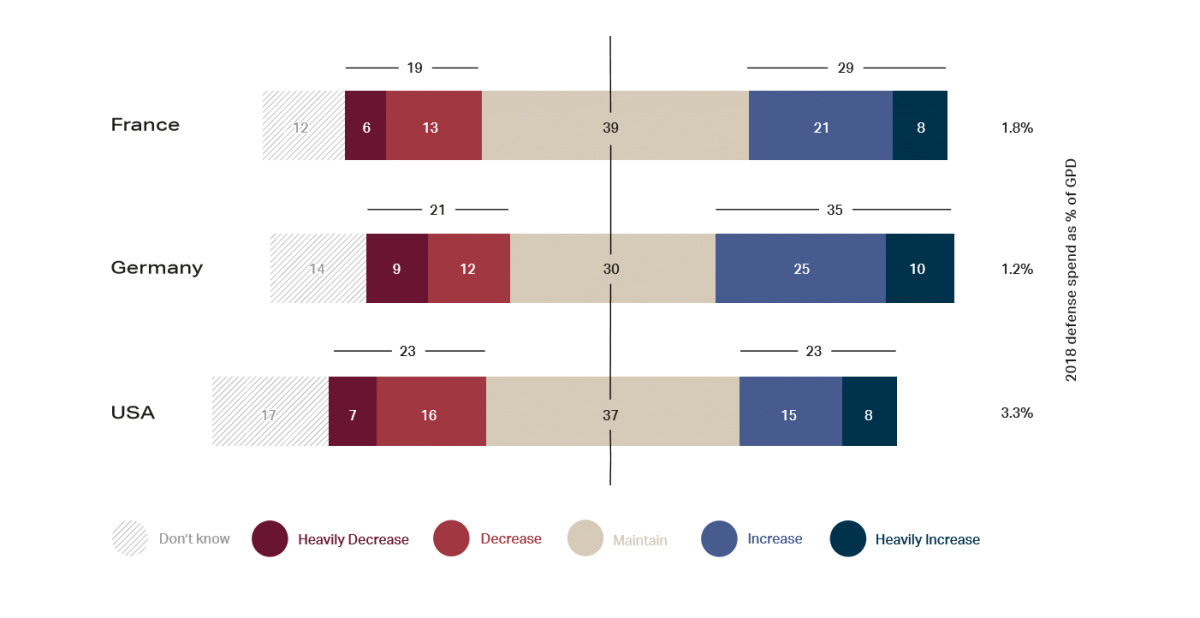
Sample: France 1004; Germany 1001; USA 1001. Expressed in % rounded up to the next unit for decimals .5 and higher.
Should your government increase or decrease its engagement with the following security issues?
More engagement with Iran is a priority in all three countries. In France there are signs of “war fatigue,” while Germans and Americans express a somewhat stronger appetite for increasing international involvement.
Almost across the board a quarter to a third of French respondents favor decreasing involvement in international security issues and almost a quarter do not have an opinion on the topic.
The exception is on the issues of restricting Iran’s access to nuclear weapons, where 28% of French want more involvement (and 38% want to see current levels maintained). Relatively high levels of concern in all three countries for restricting Iran’s access to nuclear weapons may be due to timing, as this question was asked right after Iranian General Suleimani was killed by an American drone and tensions were high. With the exception of Syria, the number of French who want to decrease involvement is double (or more) than of those who want to see more engagement, including roughly a third of French wanting less involvement in Afghanistan, Ukraine, and the Korean Peninsula. Members of the National Rally, like its far-right-wing cousin in Germany, AfD, consistently want to lower their country’s involvement with these issues.
Germans are more willing to increase their role in international security issues. Iran stands out as the top security threat, with 49 percent of Germans saying they want Germany to get more involved (21 and 9 points higher than in France and the United States, respectively). This number is highest among the Greens, (62%) and CDU/CSU respondents (59%). A plurality of Germans (37%) also favor greater involvement in Syria. German respondents also show a much higher appetite for increased involvement in Afghanistan and Ukraine than the French or Americans.
Do you think your country's government should increase or decrease its involvement in the following security issues?
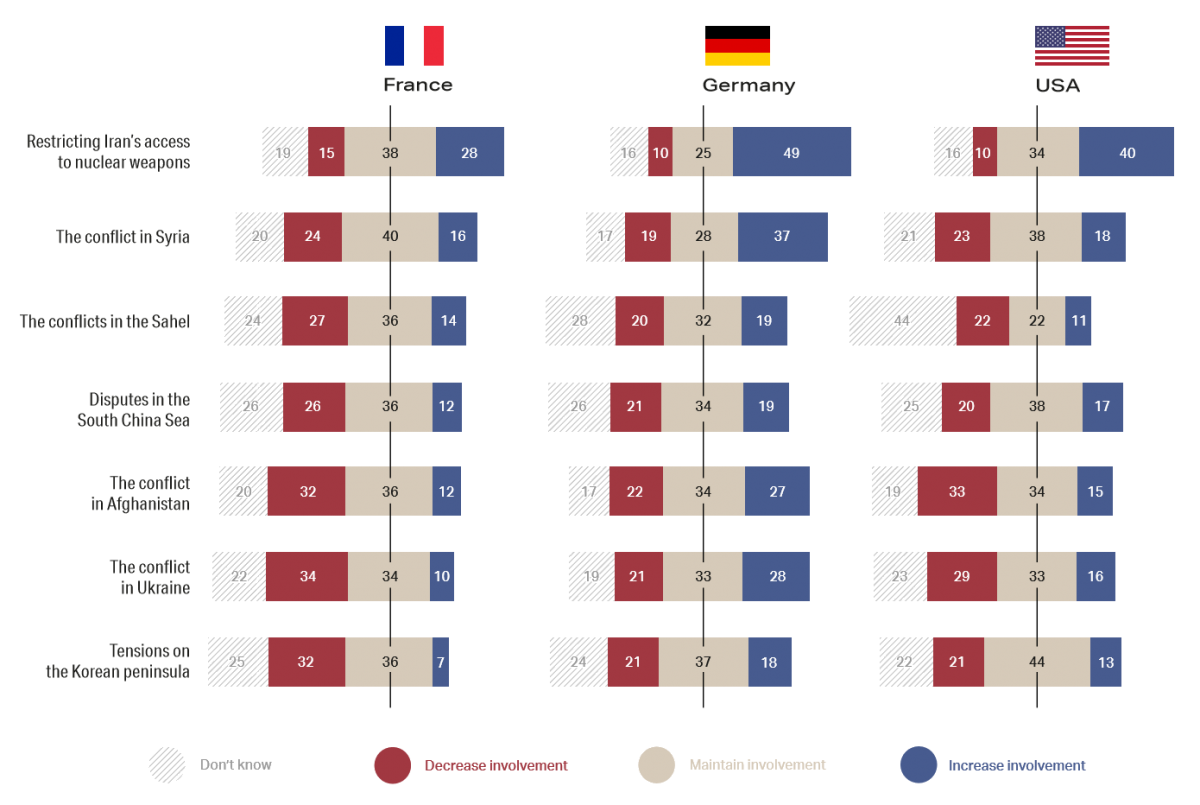
Sample: France 1004; Germany 1001; USA 1001. Expressed in % rounded up to the next unit for decimals .5 and higher.
We may be seeing in these responses a discrepancy in the understanding of the term “involvement” among the three countries. If the Americans and French understand involvement primarily as military action, the high support from Green respondents for involvement could suggest that with "involvement," Germans also have economic and developmental assistance in mind.
Only on Iran do a plurality of Americans want to see more engagement (40%). There is a notable fatigue for the conflict in Afghanistan, with 33% in favor of decreasing U.S. involvement there. The South China Sea and Korean peninsula security issues benefit from slightly stronger American support (38% and 44% respectively, for maintaining involvement). In Syria, a plurality of Americans (38%) want to maintain the current level of engagement, despite the administration’s decision to drastically reduce the number of troops in the country. Republican respondents are more hawkish on Syria, with 67% in favor of either maintaining or increasing involvement.
Notable with this question is a high percentage of respondents answering "don't know." This is in part not surprising since foreign policy is often not a particularly salient topic for most citizens. The very high number of Americans who do not know what to do about engagement in the Sahel is likely due to the fact that it is not a commonly used term in the United States as well as due to the fact that U.S. engagement there is not high profile. France's engagement in the region, in contrast, is extensive, and yet a quarter of the public (24%) do not know whether their government should be doing more or less. Similarly, though France ended its combat mission in Afghanistan in 2012, 32% of the French want to see less engagement there.